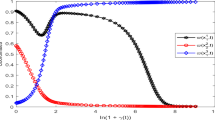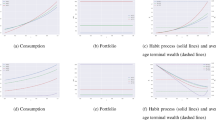Abstract
This paper describes computational techniques for finding all equilibria in infinitely repeated games with discounting and perfect monitoring. It illustrates these techniques with a three player Cournot game. This is the first infinitely repeated three player game ever solved. The paper also presents the solution for the set of equilibria in a two country tariff war. In both games the set of equilibria is large even when the players are not patient.
Similar content being viewed by others
References
Abreu, D. 1983, On the theory of infinitely repeated games with discounting. Ph.D. Thesis, Princeton University.
Abreu, D. 1988, On the theory of infinitely repeated games with discounting. Econometrica, 56, 383–396.
Abreu, D. 1986, Extremal equilibria of oligopolistic supergames. Journal of Economic Theory, 39, 191–225.
Abreu, D., Pearce, D. and Stacchetti, E. 1986, Optimal cartel equilibria with imperfect monitoring. Journal of Economic Theory, 39, 251–269.
Abreu, D., Pearce, D. and Stacchetti, E. 1990, Toward a theory of discounted repeated games with imperfect monitoring. Econometrica, 58 1041–1064.
Conklin, J. and Judd, K. 1993, Computing Supergame Equilibria. mimeo, Stanford.
Cronshaw, M.B. and Luenberger, D.G. 1994, Strongly symmetric subgame perfect equilibria in infinitely repeated games with perfect monitoring and discounting. Games and Economic Behavior, 6, 220–237.
Cronshaw, M.B. and Rutherford, T.F. 1993, (Even Impatient) Small countries can win tariff wars. mimeo, University of Colorado.
Drud, A. 1985, A GRG code for large sparse dynamic nonlinear optimization problems. Mathematical Programming, 31, 153–191.
Friedman, J.W. 1977, Oligopoly and the theory of games. North Holland.
Fudenberg, D. and Maskin, E. 1986, The Folk theorem in repeated games with discounting and incomplete information. Econometrica, 54, 533–554.
Fudenberg, D. and Maskin, E. 1991, On the dispensability of public randomization in discounted repeated games. Journal of Economic Theory, 53, 428–438.
Kennan, J. and Riezman, R. 1988, Do big countries win tariff wars? International Economic Review, 29, 81–85.
Gasiorek, M., Smith, A. and Venables, A.J. 1989, Tariffs, subsidies and retaliation. European Economic Review, 33, 480–489.
Harrison, G. and Rutström, E.E. 1991, Trade wars, trade negotiations and applied game theory. The Economic Journal, 101, 420–435.
Markusen, J.R. and Wigle, R.M. 1989, Nash equilibrium tariffs for the United States and Canada: The roles of country size, scale economies and capital mobility. Journal of Political Economy, 97, 368–386.
Riezman, R. 1991, Dynamic tariffs with asymmetric information. Journal of International Economics, 30, 267–283.
Author information
Authors and Affiliations
Rights and permissions
About this article
Cite this article
CRONSHAW, M.B. Algorithms for Finding Repeated Game Equilibria. Computational Economics 10, 139–168 (1997). https://doi.org/10.1023/A:1008670607684
Issue Date:
DOI: https://doi.org/10.1023/A:1008670607684




